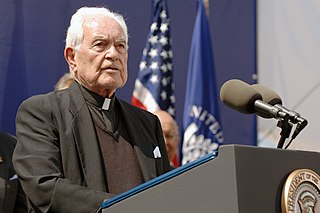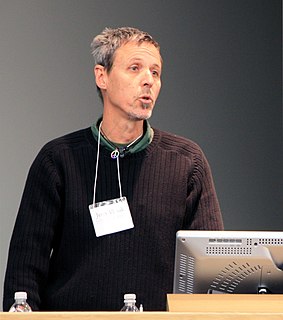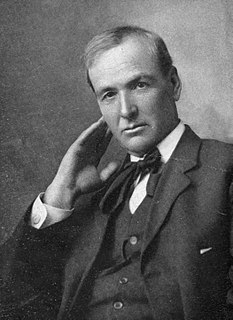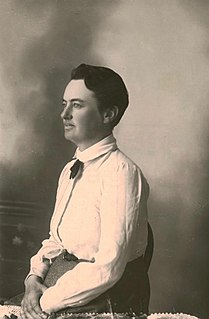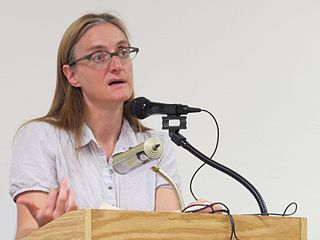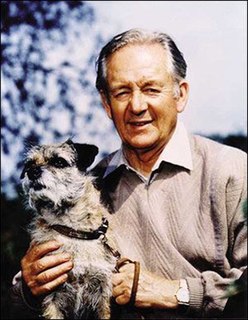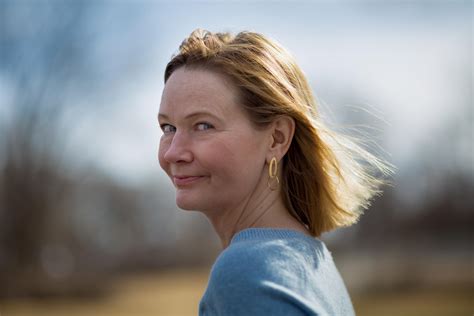Top 288 Farms Quotes & Sayings - Page 5
Explore popular Farms quotes.
Last updated on November 30, 2024.
The melting pot failed to function in one crucial area. Religions and nationalities, however different, generally learned to live together, even to grow together, in America. But color was something else. Reds were murdered like wild animals. Yellows were characterized as a peril and incarcerated en masse during World War ii for no really good reason by our most liberal president. Browns have been abused as the new slave labor on farms. The blacks, who did not come here willingly, are now, more than a century after emancipation by Lincoln, still suffering a host of slave like inequalities.
Brambles, in particular, protect and nourish young fruit trees, and on farms bramble clumps (blackberry or one of its related cultivars) can be used to exclude deer and cattle from newly set trees. As the trees (apple, quince, plum, citrus, fig) age, and the brambles are shaded out, hoofed animals come to eat fallen fruit, and the mature trees (7 plus years old) are sufficiently hardy to withstand browsing. Our forest ancestors may well have followed some such sequences for orchard evolution, assisted by indigenous birds and mammals.
Things are so busy and so quick, and there’s so much going on, you have to realise the time when you have to take a step back, take a breath and really think back to where you come from. I’m from a very, very rural place. There’s really nobody out there, just roads and farms. I had a long transition to get to where I am now. I moved away when I was young, when I was about 19. I’d literally come from an area with dirt roads and stuff like that, right to the centre of a city of about five million people. It’s been great. I’m based in New York and every day it's amazing.
The foundation is being laid for the emergence of both wind and solar cells as cornerstones of the new energy economy. World wind generating capacity grew from 7,600 megawatts in 1997 to 9,600 in 1998, an expansion of 26 percent. At a national level, Germany led the way, adding 790 megawatts of capacity, followed by Spain with 380 megawatts, and the United States with 226 megawatts. In the past, U.S. wind generating capacity was concentrated in California, but in 1998, wind farms began generating electricity in Minnesota, Oregon, and Wyoming, broadening the new industry's geographical base.
Humans are pack animals. In Biblical times, the great market cities in Europe or the United States, people want to be with other people. And in a way, the more that we're isolated, whether we're living on farms and we're only talking to our cell phone, the greater the need we have for group experience. So while people are saying that no one is going to go shopping because it's just inconvenient, and it's not as easy as buying online, why are people going to concerts? Why are people going to museums? Why are they going to sporting events?
In America, we have freedom of choice. But some are free to choose between Lamborghini and Rolls Royce while others are free to choose which dumpster they're going to have their meal out of next. Some are free to choose which, you know, homes and farms to foreclosed on, while others choose which bridge they're going to sleep under tonight.
Some people may argue that if the animals are treated humanely prior to being slaughtered, this justifies their confinement and slaughter. Is it ethical to rob beings of their freedom but give them a comfortable prison and provide them with food until they become fat enough to be slaughtered? Any way you look at it, farms are places where animals are kept in preparation to be slaughtered and ultimately eaten as food.
Some meat eaters defend meat eating by pointing out that it is natural: in the wild, animals eat one another. The animals that end up on our breakfast, lunch, and dinner plates, however, aren't those who normally eat other animals. The animals we exploit for food are not the lions and tigers and bears of the world. For the most part, we eat the gentle vegan animals. However, on today's farms, we actually force them to become meat eaters by making them eat feed containing the rendered remains of other animals, which they would never eat in the wild.
What the meat industry figured out is that you don't need healthy animals to make a profit. Sick animals are more profitable... Factory farms calculate how close to death they can keep animals without killing them. That's the business model. How quickly they can be made to grow, how tightly they can be packed, how much or how little can they eat, how sick they can get without dying...We live in a world in which it's conventional to treat an animal like a block of wood.
If that means going onto their farms, releasing their animals and burning the place to the ground, that's morally justifiable, in our opinion...There were always innocent people who got hurt somewhere along the way but it was important that those who oppressed one group of people be stopped, and we don't see the animal liberation struggle being substantially different from these other struggles.... A sustained campaign against a particular industry or a particular organization has the potential to be quite effective.
A sturdy lad from New Hampshire or Vermont who in turn tries all the professions, who teams it, farms it, peddles, keeps a school,preaches, edits a newspaper, goes to Congress, buys a township, and so forth, in successive years, and always like a cat falls on his feet, is worth a hundred of these city dolls. He walks abreast with his days and feels no shame in not "studying a profession," for he does not postpone his life, but lives already.
I do think that there is a big difference between family farms and agri-business, and one of the distressing things that I think has occurred is with consolidation of farm lands. You've seen large agri-businesses benefit from enormous profits from existing farm programs, and I think we should be focusing most of those programs on those family farmers.
I drive out to this quail farm, where I get a lot of these incredible quail eggs, which I eat all day long. And I eat a lot of superfoods like goji, cacao and chia seeds, things like that. And I like unpasteurised milk of the goat and the sheep. They send it once a week from Pennsylvania, from the Amish farms, and I get it in Los Angeles.
Needless to say, jamming deformed, drugged, overstressed birds together in a filthy, waste-coated room is not very healthy. Beyond deformities, eye damage, blindness, bacterial infections of bones, slipped vertebrae, paralysis, internal bleeding, anemia, slipped tendons, twisted lower legs and necks, respiratory diseases, and weakened immune systems are frequent and long-standing problems on factory farms.
These sprays, dusts, and aerosols are now applied almost universally to farms, gardens, forests, and homes-nonselective chemicals that have the power to kill every insect, the 'good' and the 'bad,' to still the song of birds and the leaping of fish in the streams, to coat the leaves with a deadly film, and to linger on in soil-all this though the intended target may be only a few weeds or insects. Can anyone believe it is possible to lay down such a barrage of poisons on the surface of the earth without making it unfit for all life? They should not be called 'insecticides,' but 'biocides.'
Because we're becoming such an urban nation, we're going to need to be producing so much more food in cities. These institutions have members, obviously. They have the resources to start projects like urban farms and gardens, teaching tools, and the ability to educate their members so that they can then go home and start their own urban gardens. I just really think that faith-based institutions can take the lead in creating community-based food systems, and I'd really like to see that happen.
Undercover investigations threw back the curtain on the systemic exploitation of animals on factory farms. The response by agribusiness interests has been to back laws that ban animal advocates from taking pictures or videos at these facilities, and ban the media from publishing any that are taken. The laws also make it a crime for animal advocates to seek employment at animal enterprises without disclosing their intentions.
The most agreeable thing in life is worthy accomplishment. It is not possible that the idle tramp is as contented as the farmers along the road who own their own farms, and whose credit is good at the bank in town. When the tramps get together at night, they abuse the farmers, but do not get as much satisfaction out of it as do the farmers who abuse the tramps. The sounder your argument, the more satisfaction you get out of it.
What you hear in focus groups and conversations, people will give you 20 minutes of rage about how the borders are out of control. But then you start saying, practically, what are we going to do about it? What are we going to do about the 11 million here? What are we going to do to get some workers we need for the farms? Then people start having a normal conversation.
It will never be the case that people won't eat meat. I think it could conceivably be the case one day that people eat very small amounts of it. That it's a special thing, rather than reach for it because it's cheap or reach for it because it's convenient, that it becomes something festive or something celebratory, once a week, and that could actually be achieved on small farms if we really changed our habits.
If people knew how badly animals were treated in today's factory farms, if people knew how completely confined and immobilized these creatures are for their entire lives, if people knew how severe and unrelenting is the cruelty these animals are forced to endure, there would be change. If people knew. But too many of us choose to look the other way, to keep the veil in place, to remain unconscious and caught in the cultural trance. That way we are more comfortable. That way is convenient. That way we don' t have to risk too much. This is how we keep ourselves asleep.
The time is now near at hand which must probably determine whether Americans are to be freemen or slaves; whether they are to have any property they can call their own; whether their houses and farms are to be pillaged and destroyed, and themselves consigned to a state of wretchedness from which no human efforts will deliver them. The fate of unborn millions will now depend, under God, on the courage and conduct of this army. Our cruel and unrelenting enemy leaves us only the choice of brave resistance, or the most abject submission. We have, therefore, to resolve to conquer or die.
All communities, and low-income communities especially because of food insecurity and lack of access to healthy foods, need more farmers markets, need more community gardens and urban farms. It would be great if people living in communities had the tools and resources to grow food in their own backyard - community-based food systems.
Kinship among nations is not determined in such measurements as proximity of size and age. Rather we should turn to those inner things - call them what you will - I mean those intangibles that are the real treasures free men possess. To preserve his freedom of worship, his equality before law, his liberty to speak and act as he sees fit, subject only to provisions that he trespass not upon similar rights of others - a Londoner will fight. So will a citizen of Abilene. When we consider these things, then the valley of the Thames draws closer to the farms of Kansas and the plains of Texas.
The summer ends and we wonder who we are And there you go, my friends, with your boxes in your car And today I passed the high school, the river, the maple tree I passed the farms that made it Through the last days of the century And I knew that I was going to learn again Again, in this less hazy light I saw the fields beyond the fields The fields beyond the field
I shall speak only of the part I have stayed in- the districts of Lakes Ochrida and Presba. Here there are Greeks, Slavs, Albanians, and Vlahs. Of Turks, except officials and such of the army as may be quartered on the spot, there are few. The Albanians, I believe, are all Moslem. Should there be any Christians they would be officially classed as Greeks. A large part of the land near Lake Presba is owned by Moslem Albanians as ' chiftliks '(farms).
My argument for that is: Why not create urban farms that are like parks, on public land? There actually is a park that I see as a model: Dover Street Park in Oakland. They took this park that has swings and playground-type things and turned it into a farm. There's not chickens, just annual vegetables interspersed with fruit trees. And it's super cool because you see people playing with their kids and then they go pick raspberries and some greens for dinner.
America, we cannot turn back. Not with so much work to be done. Not with so many children to educate, and so many veterans to care for. Not with an economy to fix and cities to rebuild and farms to save. Not with so many families to protect and so many lives to mend. America, we cannot turn back. We cannot walk alone. At this moment, in this election, we must pledge once more to march into the future. Let us keep that promise - that American promise - and in the words of Scripture hold firmly, without wavering, to the hope that we confess.
We also look at farming. Are we making sure that we're getting the latest seeds out to women so they can get a bigger yield off of their farms? A new type of seed that gets out to a man, let's say, that's drought resistant - because, of course, the rains are changing in Africa with climate change - if you don't put it in the hands of a woman, she won't necessarily get it. We look at breaking down all those barriers.
The smell of factory farms . . . many notice these places only when the odours reach their homes, affecting their own quality of life. We create these animals for our profit and pleasure, playing with their genes, violating their dignity as living creatures, forcing them to lie and live in their own urine and excrement, turning pens into penitentiaries and frustrating their every desire except what is needed to keep them breathing and breeding. And then we complain about the smell.
Yes! I hate everything about this country. Like, I hate fat white Americans. All the people who are crunched into the middle of America, the real fat and meat of America, are these racist conservative white people who live on their farms. Those little teenage girls who work at Kmart and have a racist grandma — that’s really America.
Church wealth are moving into everything-gas stations, banks, television stations, supermarket chains, hotels, steel mills, resort areas, farms, wine factories, warehouses, bottling works, printing plants, schools, theaters-everything you could conceivably think of that has nothing to do with religion, they are moving into big. They're even coming in as stockholders in the big oil companies, and the Bank of America is almost entirely owned by the Catholic Church.
There would be no call for ecological campaigning had nature not been exploited and abused. We experience the ground now bringing forth thistles as soil erosion devastates formerly arable land and deserts overtake fertile farms. Rivers and the atmosphere are polluted thoughtlessly and we are fearful of the consequences of a depleted ozone layer and the devastation of the greenhouse effect. We are not quite at home in our world, and somewhere in each of us there is a nostalgia for a paradise that has been lost.
[About reading Rachel Carson's Silent Spring, age 14, in the back seat of his parents' sedan. I almost threw up. I got physically ill when I learned that ospreys and peregrine falcons weren't raising chicks because of what people were spraying on bugs at their farms and lawns. This was the first time I learned that humans could impact the environment with chemicals. [That a corporation would create a product that didn't operate as advertised] was shocking in a way we weren't inured to.
We have a right to expect that the best trained, the best educated men on the Pacific slope, the Rocky Mountains, and great plains States will take the lead in the preservation and right use of forests, in securing the right use of waters, and in seeing that our land policy is not twisted from its original purpose, but is perpetuated by amendment, by change when such change is necessary in the life of that purpose, the purpose being to turn the public domain into farms each to be the property of the man who actually tills it and makes his home in it.
And there was that letter from the Bramleys—that really made me feel good. You don’t find people like the Bramleys now; radio, television and the motorcar have carried the outside world into the most isolated places so that the simple people you used to meet on the lonely farms are rapidly becoming like people anywhere else. There are still a few left, of course—old folk who cling to the ways of their fathers and when I come across any of them I like to make some excuse to sit down and talk with them and listen to the old Yorkshire words and expressions which have almost disappeared.
Rome wasn't built in a day, and we won't replace fossil fuels with clean energy based on the events of a single week, either. But the important thing to remember is that, once they happen, clean energy victories are irreversible. No one will tear down wind farms because they are nostalgic for fracking in our watersheds. And nobody will pull down their solar panels because they miss having mercury in their tuna or asthma inhalers for their kids. Because once we leave fossil fuels behind, we are never going back.
A farm includes the passion of the farmer's heart, the interest of the farm's customers, the biological activity in the soil, the pleasantness of the air about the farm -- it's everything touching, emanating from, and supplying that piece of landscape. A farm is virtually a living organism. The tragedy of our time is that cultural philosophies and market realities are squeezing life's vitality out of most farms. And that is why the average farmer is now 60 years old. Serfdom just doesn't attract the best and brightest.
Suppose that the US really is trying to get rid of drugs in Colombia. Does Colombia then have the right to fumigate tobacco farms in Kentucky? They are producing a lethal substance far more dangerous than cocaine. More Colombians die from tobacco-related illnesses than Americans die from cocaine. Of course, Colombia has no right to do that.
To argue that we need some technology in order to produce food to tackle hunger is completely blind to the facts on the ground. Actually, what we need is the exact opposite of what GMOs give us. We have to empower farmers to grow food for themselves and plant and grow their own seeds and use practices to deal with weeds and the need for fertility, not from purchased products like a seed or a chemical, but from their own farms, from their own knowledge and skill sets.
Our point of view is, lets not be so elitist that we can't honor good, hard, dignified, ennobling work: people working with their hands, building things, putting up solar panels, weatherizing homes, working on organic agriculture, building wind farms. We don't have robots in society, so somebody has to do that work. Lets make sure that the people who can use that work get a chance to do it. I see that as a first step toward bigger and better things.
If we are defined by reason and morality, then reason and morality must define our choices, even when animals are concerned. When people say, for example, that they like their veal or hot dogs too much to ever give them up, and yeah it's sad about the farms but that's just the way it is, reason hears in that the voice of gluttony. We can say that what makes a human being human is precisely the ability to understand that the suffering of an animal is more important than the taste of a treat.
I read and am liberated. I acquire objectivity. I cease being myself and so scattered. And what I read, instead of being like a nearly invisible suit that sometimes oppresses me, is the external world’s tremendous and remarkable clarity, the sun that sees everyone, the moon that splotches the still earth with shadows, the wide expanses that end in the sea, the blackly solid trees whose tops greenly wave, the steady peace of ponds on farms, the terraced slopes with their paths overgrown by grape-vines.
Shooting stars are not really stars at all but meteorites, burning their way through our atmosphere, sometimes landing in the oceans and in the middle of farms...you could make wishes on them if you like, but they are really just pieces of rock falling down from the sky, and they could land on your head and kill you just as you look up to make a wish. Really, they're just rocks. They don't care about your wishes at all.
I have never seen an adequate description anywhere of the amazement, the uncomprehending horror of the bulk of the American people which preceded the firing of that gun at Sumter. Politicians or far-sighted leaders on both sides knew what was coming. And it is they who have written histories of the war. But to the easy-going millions, busied with their farms or shops, the onrushing disaster was as inexplicable as an earthquake. Their protest arose from sea to sea like the clamor of a gigantic hive of frightened bees.
I see young men, my townsmen, whose misfortune it is to have inherited farms, houses, barns, cattle, and farming tools; for these are more easily acquired than got rid of. Better if they had been born in the open pasture and suckled by a wolf, that they might have seen with clearer eyes what field they were called to labor in. Who made them serfs of the soil? Why should they eat their sixty acres, when man is condemned to eat only his peck of dirt? Why should they begin digging their graves as soon as they are born?
I feel very strongly, we've got to give animals a good life. I've worked really hard improving slaughter plants and animal handling and transport. And people have said to me, why don't you work on improving conditions on pig farms? And basically, to be effective on making real change out there on the ground, you can only work on so many things. You know, you get too distributed, you're not effective.
There's also a growing trend toward having gardens in schools to literally show kids where food comes from by having them grow and prepare their own food. There's also a movement that's bringing farmers into schools and creating relationships between local farms and local cafeterias, so that instead of frozen mystery meat, you have fresh produce that's coming from the area that has a name and a face associated with it.
